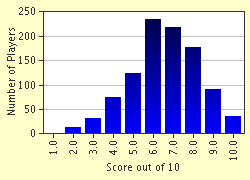Quiz Answer Key and Fun Facts
1. The Greek god of sleep is Hypnos. What does "hypnic jerk" mean?
2. Which of the following is NOT a physiologic change found during normal sleep?
3. As a percentage of total sleep, infants have more REM sleep than adults.
4. Which part of your brain is responsible for your circadian rhythm, which encourages you to sleep and wake in a more or less regular cycle?
5. What is a childhood sleep occurrence during non-REM sleep that is characterized by screaming and thrashing about, even though the child remains asleep?
6. Humans not only need sleep, we seem to need to sleep at NIGHT. Which of the following has NOT been suggested by clinical studies to be a negative effect of shift work?
7. People with mental disorders naturally dream less or don't dream at all.
8. Which of the following sleep facts is supported by medical evidence?
9. Which of the following sleep disturbances can sometimes be treated by uvulopalatopharyngoplasty?
10. A 2003 study in Britain revealed that 6 out of 10 British men would rather sleep than do what?
Source: Author
LilahDeDah
This quiz was reviewed by FunTrivia editor
crisw before going online.
Any errors found in FunTrivia content are routinely corrected through our feedback system.


